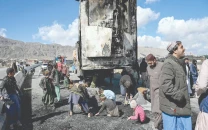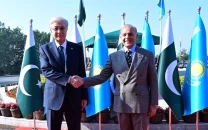Our apathy towards bonded labourers
It’s no news that the Pakistani government has been quite unable to enforce labour laws.

A recent Time Magazine story highlighted an interesting proposal made by an Australian billionaire to end this practice many of us may decry. The practice is bonded labour. Mining magnate Andrew Forrest’s offer is specific to the brick making industry, where around 1.8 million people work. Thousands of these brick makers were born to kiln workers, inherited their fathers’ jobs due to debt transference and will die as kiln workers, with their children inheriting their debts and their jobs.
Forrest offered to introduce biomass gasification — an Australian invention which, if implemented in Pakistan, would convert uneconomic lignite coal into diesel fuel and in the very process promise alternative jobs.
If Forrest’s plan is implemented, it could help address the fuel and electricity problems that the country is facing, while simultaneously creating thousands of new jobs. All that Pakistan needs to do is live up to a pledge to free bonded labourers and introduce stricter child labour and minimum wage laws. All of them will be easily assimilated in fresh jobs, where they will be paid as per their efforts. But why would this ever be implemented?
Pakistan spends billions on glossy projects while millions still live in abject poverty. We introduce controlled prices on agriculture products that have no positive impact on sharecroppers, but a significant one on mill owners.
In 1995, Iqbal Masih, a 12-year-old former bonded labour-turned-rights activist was shot dead, probably at the behest of his former master. Nobody went to jail. But then, despite laws against bonded labour being on the books for decades, no one has gone to jail for that either. We don’t really care, do we?
Published in The Express Tribune, February 8th, 2014.



















COMMENTS
Comments are moderated and generally will be posted if they are on-topic and not abusive.
For more information, please see our Comments FAQ